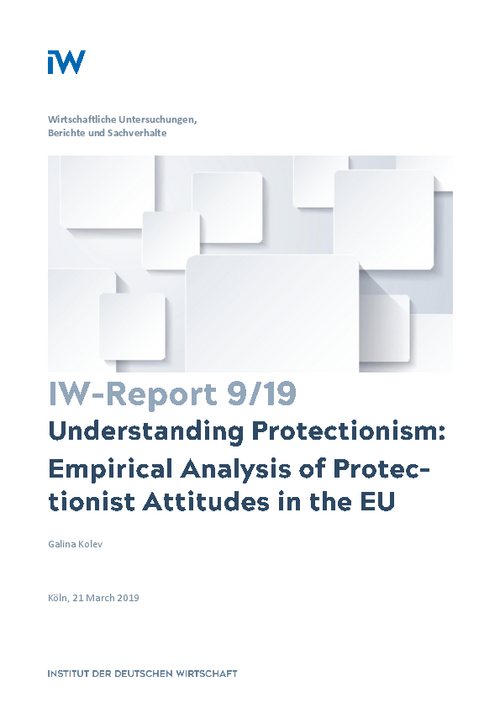A changing landscape in trade policy in recent years is undoubtedly related to changing voter preferences. Based on Eurobarometer survey data, the present paper investigates both the factors determining the level of support for protectionism and the striking inconsistency of responses to questions related to free trade and protectionism.

Understanding Protectionism: Empirical Analysis of Protectionist Attitudes in the EU
IW-Report

A changing landscape in trade policy in recent years is undoubtedly related to changing voter preferences. Based on Eurobarometer survey data, the present paper investigates both the factors determining the level of support for protectionism and the striking inconsistency of responses to questions related to free trade and protectionism.
EU citizens are more likely to support protectionism when the economy runs smoothly and rejects protectionism if the national economy is not in the best shape. Unemployment, bad economic situations as well as negative feelings regarding immigration are identified as possible reasons to call for protectionism while respondents are favouring free trade at the same time. The inconsistent attitudes toward free trade and protectionism are a matter of lacking knowledge of political issues. Better educated EU citizens are all less likely to support free trade and protectionism at the same time. This applies to respondents who show a higher level of knowledge regarding basic EU-related facts as well as to those who discuss political matters with friends more often. A possible way to tackle this problem is a broad information strategy covering the topics of international economics across several media channels. Especially radio, press and internet are identified as media which seem to contribute to a better understanding of these complex issues.

Galina Kolev: Understanding Protectionism – Empirical Analysis of Protectionist Attitudes in the EU
IW-Report


Inflation in der Eurozone: Der Weg bleibt holprig
Die Inflation in der Eurozone befindet sich auf dem Rückzug. Ein Aufatmen wäre aber verfrüht. Zweitrundeneffekte im Arbeitsmarkt sind im vollen Gange und setzen die Geldpolitik weiter unter Druck.
IW
Trump oder Harris oder …? Worauf sich Europa einstellen muss
Wenige Monate vor der Präsidentschaftswahl in den USA hat Donald Trump gute Chancen auf eine Wiederwahl. Auf Seiten der Demokraten hat der amtierende Präsident seine Kandidatur nach langem Zögern zurückgezogen, Vizepräsidentin Kamala Harris wird mit hoher ...
IW